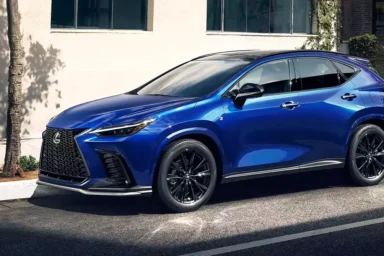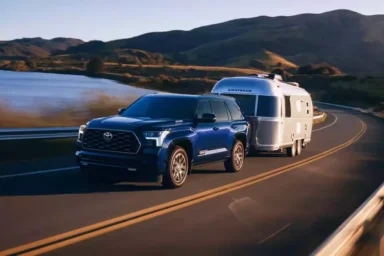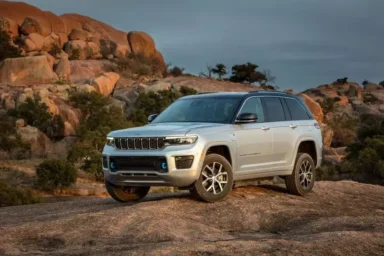Electric cars inherently offer the potential for greater cargo capacity compared to their traditional internal combustion engine (ICE) counterparts. The absence of an ICE engine under the hood allows automakers to transform this space into additional storage.
In this article, I will explore electric cars featuring the most expansive cargo areas. After analyzing over 25 electric cars available in the United States today, I present the 11 electric vehicles with the greatest cargo capacity.
Table of Contents
Rivian R1S – 105.1 ft3
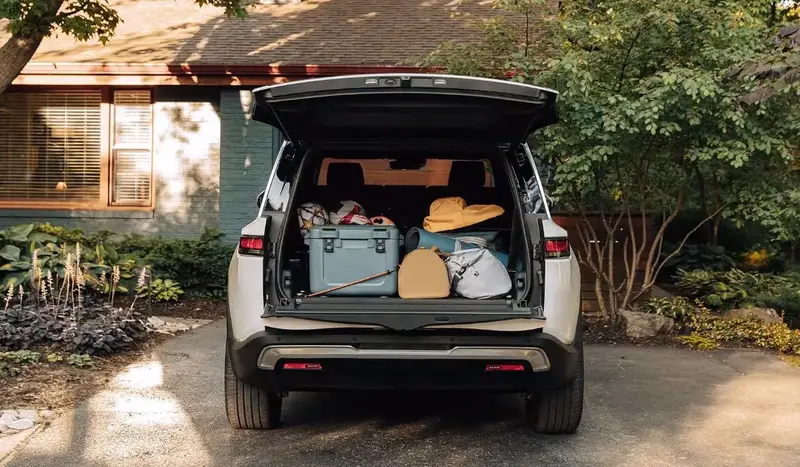
The Rivian R1S stands out as an all-electric SUV, offering impressive cargo space to accommodate various needs.
The R1S features a rear trunk with 17.6 cubic feet of storage and a front trunk, also known as a “frunk,” which provides an additional 12.0 cubic feet of space. With the seats folded, the cargo capacity expands significantly to a remarkable 88 cubic feet.
Additionally, the R1S offers 5.1 cubic feet of hidden storage underneath the load floor, perfect for storing smaller items or keeping valuables out of sight. In total, the Rivian R1S boasts a generous 105.1 cubic feet of cargo space.
Tesla Model X – 91.5 ft3
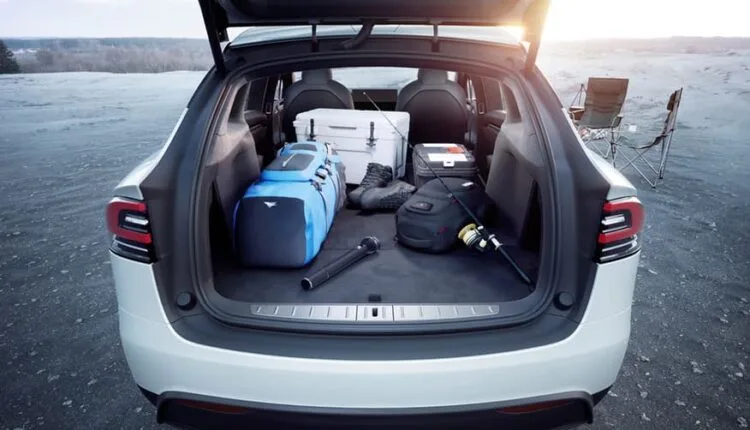
The Tesla Model X is a luxury electric crossover that is surprisingly one of the EVs with the most storage space today.
Tesla Model X features a rear trunk with 37 cubic feet of storage and a front trunk with an additional 6.5 cubic feet of space.
When the second row of seats is folded flat, the cargo capacity expands significantly to 85 cubic feet. The Tesla Model X boasts an impressive 91.5 cubic feet of cargo space.
BMW iX – 77.9 ft3
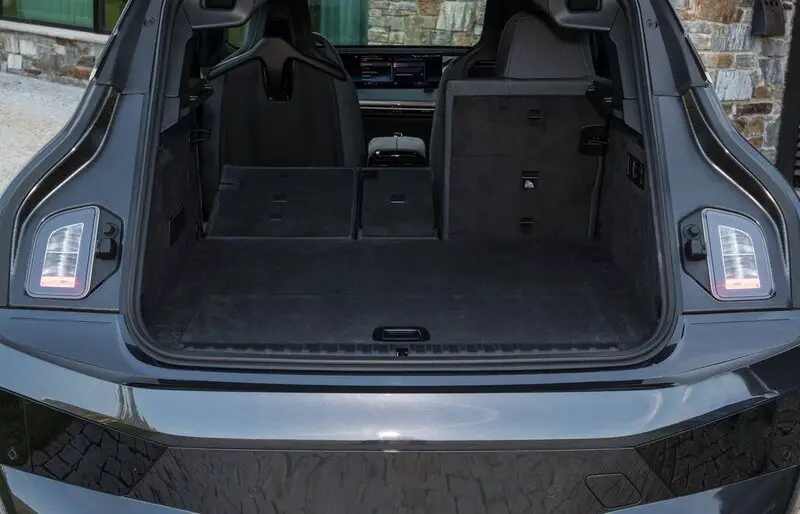
Despite criticism for its polarising design, the BMW iX is a luxury electric SUV that delivers on key aspects such as driving range, cabin quality, and spaciousness. Boasting a driving range of over 300 miles, the iX combines practicality with the premium features expected in a luxury vehicle.
BMW iX offers a rear trunk with 35.5 cubic feet of storage. When the rear seats are folded down, the cargo capacity expands to an impressive 77.9 cubic feet. This roomy interior and a well-built cabin make the iX an ideal choice for families or individuals seeking luxury and utility in an electric SUV.
Tesla Model Y – 76.2 ft3
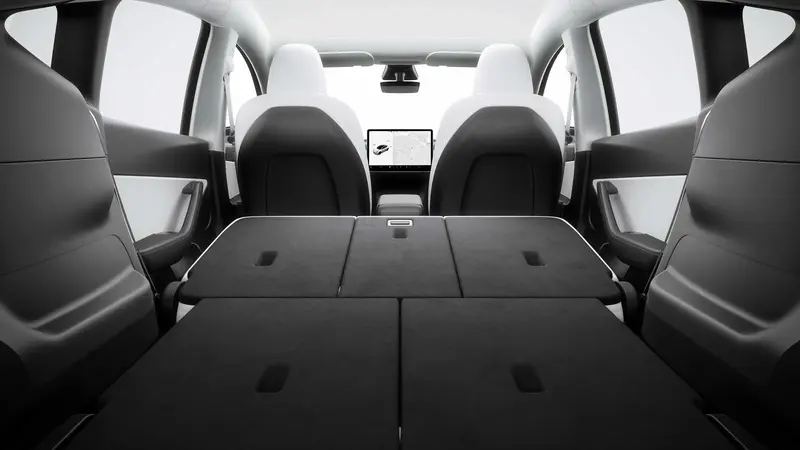
The Tesla Model Y is an undeniably impressive luxury crossover SUV, boasting a generous driving range, sporty performance, top-notch safety ratings, and a spacious interior.
As a member of the Tesla family, the Model Y shares many of the innovative features of the Model X, offering a more compact option for those seeking a versatile electric vehicle.
Focusing on cargo space and seat configuration, the Tesla Model Y provides a rear trunk with 30.2 cubic feet of storage and a front trunk, or “frunk,” offering an additional 4.1 cubic feet of space.
This front storage compartment is perfect for holding groceries or other items, adding to the overall practicality of the vehicle.
With the rear seats folded down, the Model Y’s cargo capacity expands to a substantial 72.1 cubic feet, bringing the total cargo space to 76.2 cubic feet.
Mercedes EQS SUV – 74.2 ft3
The Mercedes-Benz EQS SUV, a three-row luxury electric vehicle, masterfully combines elegance and practicality, providing discerning buyers with a truly upscale experience. Although lacking a front trunk, the SUV compensates with an impressive rear cargo area, thereby ensuring ample storage capacity.
Boasting a rear trunk with a generous 31 cubic feet of space, the EQS SUV adeptly caters to various storage needs. Furthermore, by folding the rear seats down, the available cargo area expands to an impressive 74.2 cubic feet, solidifying the vehicle’s status as both practical and luxurious.
The Mercedes-Benz EQS SUV excels in delivering a premium cabin outfitted with top-tier materials and advanced technology. Its powerful drivetrains ensure a capable driving experience, while its convenience and safety features elevate the overall driving experience.
Tesla Model S – 64.5 ft3
The Tesla Model S, a luxury electric sedan, adeptly balances performance, technology, and practicality, catering to the needs of discerning drivers.
Despite facing criticism regarding cabin quality, the Model S remains a highly sought-after vehicle, offering a spacious and versatile interior.
The Tesla Model S features a rear trunk with 25 cubic feet of storage capacity. Additionally, the front trunk provides an extra 3.1 cubic feet of space.
With the rear seats folded down, the available cargo area expands to an impressive 61.4 cubic feet, bringing the total cargo capacity to 64.5 cubic feet. The sedan’s hatchback design further enhances its practicality, allowing easy access to the large cargo area.
Beyond its practical attributes, the Tesla Model S boasts incredible speed, state-of-the-art technology features, and an exceptional driving range.
Ford Mustang Mach-E – 64.4 ft3
The Ford Mustang Mach-E, a sporty electric crossover, skillfully merges performance, style, and practicality to meet the demands of discerning drivers. The Mach-E stands out in its class, offering ample cargo space and an upscale cabin, providing generous seating and storage options.
The Ford Mustang Mach-E features a rear trunk with 29.7 cubic feet of storage capacity. The “frunk” contributes an additional 4.7 cubic feet of space, making it the largest frunk in its class.
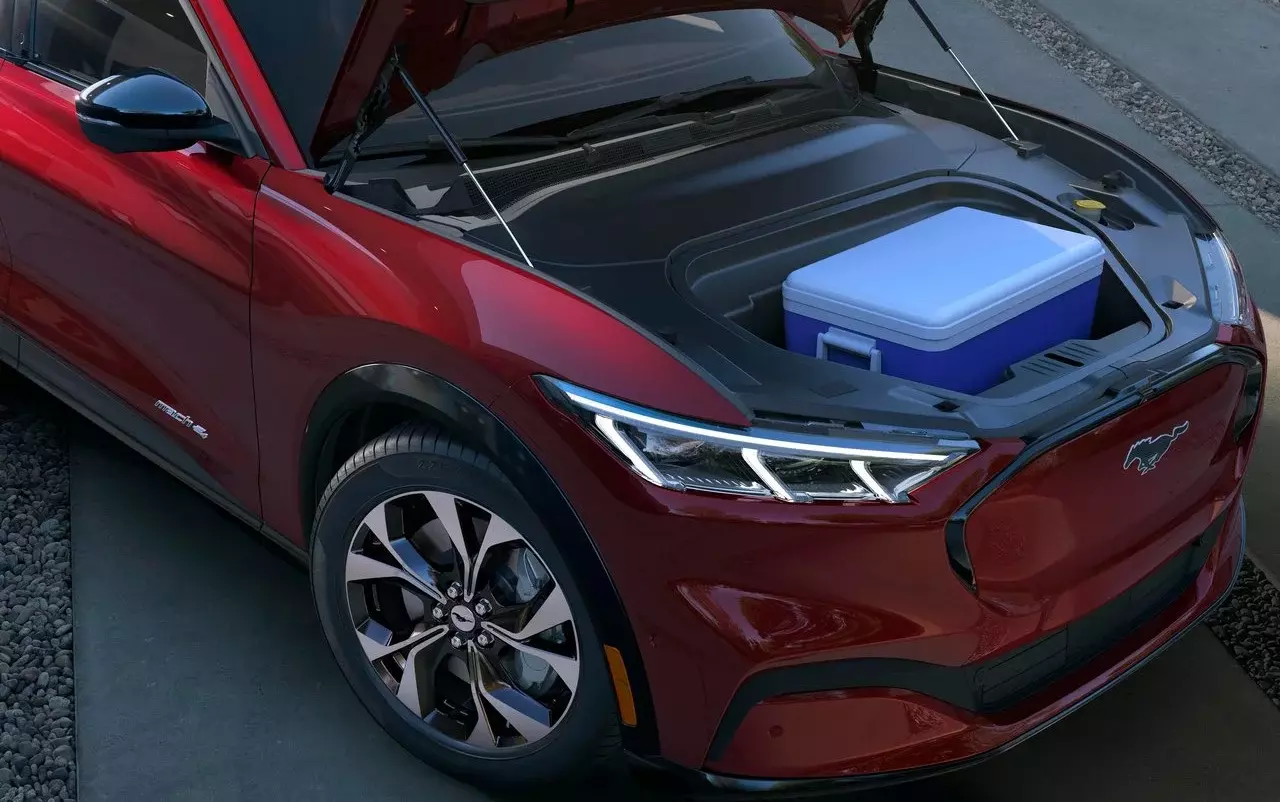
With the rear seats folded down, the available cargo area expands to 59.7 cubic feet, resulting in a total capacity of 64.4 cubic feet.
The Mach-E’s hatchback styling enhances its practicality, while its long all-electric range, lively driving dynamics, and wealth of standard features further elevate its appeal.
Boasting a spacious and upscale interior, the Ford Mustang Mach-E successfully combines luxury, performance, and utility to create a versatile electric crossover that caters to the needs of contemporary drivers.
Volkswagen ID.4 – 64.2 ft3
The Volkswagen ID.4 offers two rows of spacious and comfortable seating and expandable cargo space.
Despite lacking a front trunk, the ID.4 still offers an impressive rear trunk with an impressive 30.3 cubic feet of storage capacity.
When the rear seats are folded down, the available cargo area expands to 64.2 cubic feet, ensuring ample room for various storage needs.
Kia Niro EV – 63.7 ft3
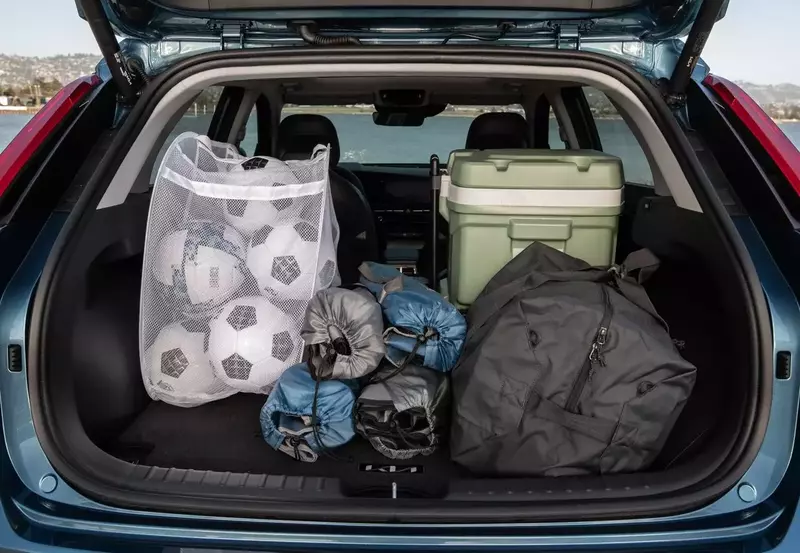
The Kia Niro EV, a small electric SUV, distinguishes itself within its class by offering a remarkably roomy interior and generous cargo space.
The 2023 Kia Niro EV provides a rear trunk with 22.8 cubic feet of storage capacity. When the rear seats are folded down, the available cargo area expands to an impressive 63.7 cubic feet. It is a decent figure for a compact footprint vehicle.
Cadillac Lyriq – 60.8 ft3
The Cadillac Lyriq, a luxury electric SUV, presents a comfortable driving experience accompanied by a sleek interior, spacious seating, and generous cargo capacity.
Equipped with a lively and quiet powertrain, the Lyriq boasts a driving range of over 300 miles on a single charge, enhancing its appeal as a practical electric vehicle.
The Lyriq offers 28 cubic feet of cargo space in the rear, which can be further expanded to 60.8 cubic feet by folding the rear seats into the floor.
Hyundai Ioniq 5 – 59.3 ft3
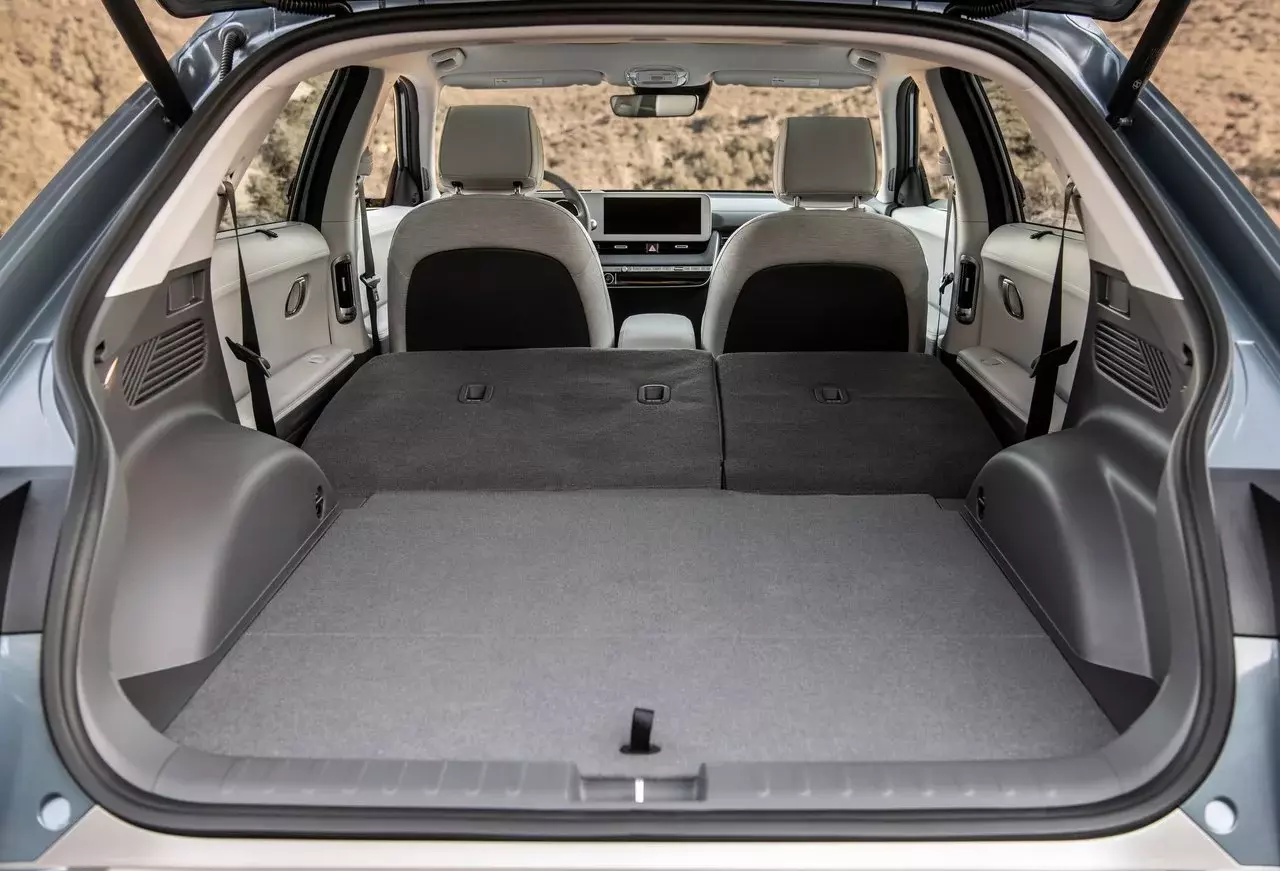
The Hyundai Ioniq 5 has garnered significant attention since its debut in 2021 thanks to its potent power, impressive driving range, comprehensive features, and spacious interior, which includes a notable cargo hold.
The Ioniq 5 offers a rear trunk with 27.2 cubic feet of storage capacity. When the rear seats are folded down, the available cargo area expands to an impressive 59.3 cubic feet.
Additionally, the Ioniq 5 features a small front trunk with approximately 1 cubic foot of space, which, although not substantial, is there when you need that.
You Might Also Like:
